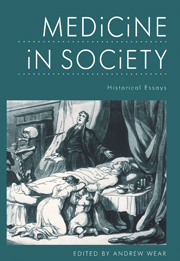Book contents
- Frontmatter
- Contents
- List of contributors
- Introduction
- Healers in the medical market place towards a social history of Graeco-Roman medicine
- Medicine and society in medieval Europe, 500-1500
- The patient in England, c. 1660–c. 1800
- Making sense of health and the environment in early modern England
- Medicine in the age of Enlightenment
- The rise of the modern hospital in Britain
- Medical practitioners 1750–1850 and the period of medical reform in Britain
- Public health, preventive medicine and professionalization: England and America in the nineteenth century
- Madness and its institutions
- From infectious to chronic diseases: changing patterns of sickness in the nineteenth and twentieth centuries
- Providers, ‘consumers’, the state and the delivery of health-care services in twentieth-century Britain
- The implications of increased life expectancy for family and social life
- Index
The implications of increased life expectancy for family and social life
Published online by Cambridge University Press: 13 January 2010
- Frontmatter
- Contents
- List of contributors
- Introduction
- Healers in the medical market place towards a social history of Graeco-Roman medicine
- Medicine and society in medieval Europe, 500-1500
- The patient in England, c. 1660–c. 1800
- Making sense of health and the environment in early modern England
- Medicine in the age of Enlightenment
- The rise of the modern hospital in Britain
- Medical practitioners 1750–1850 and the period of medical reform in Britain
- Public health, preventive medicine and professionalization: England and America in the nineteenth century
- Madness and its institutions
- From infectious to chronic diseases: changing patterns of sickness in the nineteenth and twentieth centuries
- Providers, ‘consumers’, the state and the delivery of health-care services in twentieth-century Britain
- The implications of increased life expectancy for family and social life
- Index
Summary
Introductory remarks
This chapter is characterized by a number of provisos:
1. It should not simply be a catalogue of demands for future research but should present a constructive approach to existing findings.
2. It should demonstrate the relevance of basic biological factors for social history within a changing historical framework.
3. It should contain briefly expressed ideas which would encourage interdisciplinary discussion.
I set myself three further conditions:
4. I wanted to give a presentation that was as clearly outlined and as readily understandable as possible. Short bold strokes seemed more in place than rarified discussions, even if finer differences would have to be overlooked. The proportion of text and diagrams was to be two to one.
5. Since actual life expectancy today, despite an increase, only reaches its maximum biological potential in the case of a minority, it seemed to me to be essential to show where we stand in a continuous process of development and to what changes foreseeable further development might lead. In the same way that historians put present conditions into an historical context, they are also able to see what are apparently constant factors in relation to the future, in relative terms.
6. The main aim of this chapter is, however, to urge the reader to think more deeply. Even if, because of our increased life span, the biological component of our existence no longer constantly impinges to the same extent today as it did in the past, it still remains fundamental. We are all mortal, even if we die somewhat later on. To start thinking about it then is rather late.
- Type
- Chapter
- Information
- Medicine in SocietyHistorical Essays, pp. 347 - 376Publisher: Cambridge University PressPrint publication year: 1992
- 1
- Cited by



